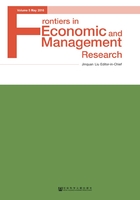
5 Conclusions and Implications
5.1 Conclusions
This paper studies the relationship among entrepreneurial cognition, entrepreneurial intention and entrepreneurial decision, conclusions as follows:
First, we verify the influence of entrepreneurial cognition on an entrepreneurial decision. Then we test two dimensions of entrepreneurial cognition independently, research results showed that ability cognitive and prepared cognitively have positive effects on entrepreneurial decisions. An entrepreneur has a higher cognition, the greater possibility to make business decisions. The study shows that the new generation of migrant workers ready to start a business with the entrepreneurial ability and cognitive situation. They will make business decisions quickly. This is consistent with the view of the theory of planned behavior (Ajzen, 1991).
Second, we verify entrepreneurial cognition positive effect on entrepreneurial intention. Also, our study verifies that the ability cognitive and prepared cognitive have a positive impact on entrepreneurial intention. The study has shown that the generation of migrant workers with better prepared cognitive can fully realize their advantages and disadvantages, coordinate their resources and improve their entrepreneurial intention. The higher ability cognitive of migrant workers can recognize entrepreneurial opportunities, which plays an important role in promoting entrepreneurial intention. Therefore, the new generation of migrant workers has the capability of awareness and comprehension about the internal and external factors. Their entrepreneurial intention is more significant.
Third, our study tests the positive influence of entrepreneurial intention toward entrepreneurial decisions. The empirical results show that entrepreneurial feasibility and entrepreneurial desirability have a positive effect on entrepreneurial decisions. These fully shows that the new generation of migrant workers have the higher likelihood of entrepreneurial, who could understand their ability and resources clearly, therefore more likely to make business decisions. The new generation of migrant workers has more fully entrepreneurial preparation. They can understand the process of entrepreneurial activity and attention problems, and provide protection for the development of entrepreneurial activity, then the possibility of making business decisions will increase significantly.
Finally, we prove the mediating role of entrepreneurial intention. In the empirical study, we use regression analysis to verify the entrepreneurial intention, and it is a partial mediator, which explains the mechanism of entrepreneurial cognition and entrepreneurial decision radically. At the same time, in the process of improving the entrepreneurial decision-making, we should exhaustively understand the factors of entrepreneurial intention, to make entrepreneurial cognition into business decisions.
In our study, we propose ten hypotheses and all these hypotheses have been verified, which fully proved the rationality of the framework. The results demonstrate the power of the perspective theory of planned behavior (Ajzen, 1991), which indicate that the new generation of migrant workers have a higher awareness of entrepreneurship, and entrepreneurial intention plays a catalytic role. Krueger (2007) also believes that a higher level of decision is determined by intention, but the intention is a deeper level of cognition to the decision[22]. In the Chinese context, the theoretical framework is verified. The entrepreneurial decision research relevant to the new generation of migrant workers can be fully confirmed, and it also shows that the theory has strong applicability.
5.2 Implications
The results of this study indicate that the new generation of migrant workers’ entrepreneurial cognition has essential effect on the entrepreneurial decision. It also gives us some other insights.
Firstly, this study verifies the new generation of migrant workers with a different perception of external resources and the environment will affect entrepreneurial activity. This requires us to strengthen the propaganda business knowledge further and improve the new generation of migrant workers’ cognitive ability continuously to strengthen their entrepreneurial intention. We may establish the migrant workers’ schools, training courses, cultural clubs and other vocational training institutions to improve the quality of business management knowledge and skills and carry out entrepreneurial success.
Secondly, as the new generation of migrant workers, the study confirms the entrepreneurial intention can positively affect their business decisions. The new generation of migrant workers has a strong desire to change the status quo. However, they are affected by the restrictions inherent in the dual structure, financial conditions, laws and regulations, restrictions and other factors, so that before the entrepreneurial activities they have to face some difficulties. Therefore, the government should strengthen safeguards for the new generation of migrant workers entrepreneurial activities, including tax relief, financial credit, land and other preferential policies to improve the entrepreneurial enthusiasm. They also have provided guidance on business management business, technology, services and other areas. It is fully reflected the government’s support for them, and increase the likelihood of potential entrepreneurs.
Thirdly, the study shows that the new generation of migrant workers recognizes entrepreneurial environment and abilities whether they will make accurate judgments about entrepreneurial activities. Therefore, it has become an important point to encourage the new generation of migrant workers to carry out entrepreneurial activities. Thus, we should implement policies to improve the financial environment and encourage the new generation of migrant workers to start businesses. By improving the guarantee system for SMEs, it can strengthen the construction of incubators venture. At the same time, we should establish and improve the laws and regulations of small and micro enterprises to guide more generation of migrant workers to carry out entrepreneurial activities, thus provide strong support for the economy and the new urbanization in rural areas.